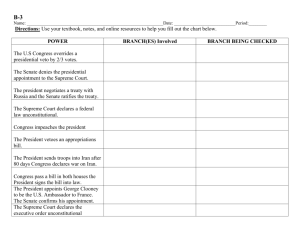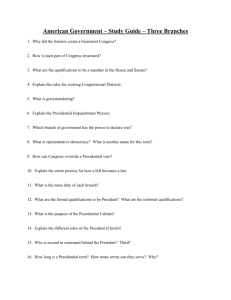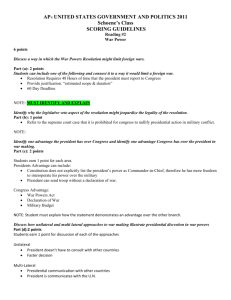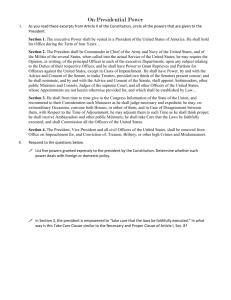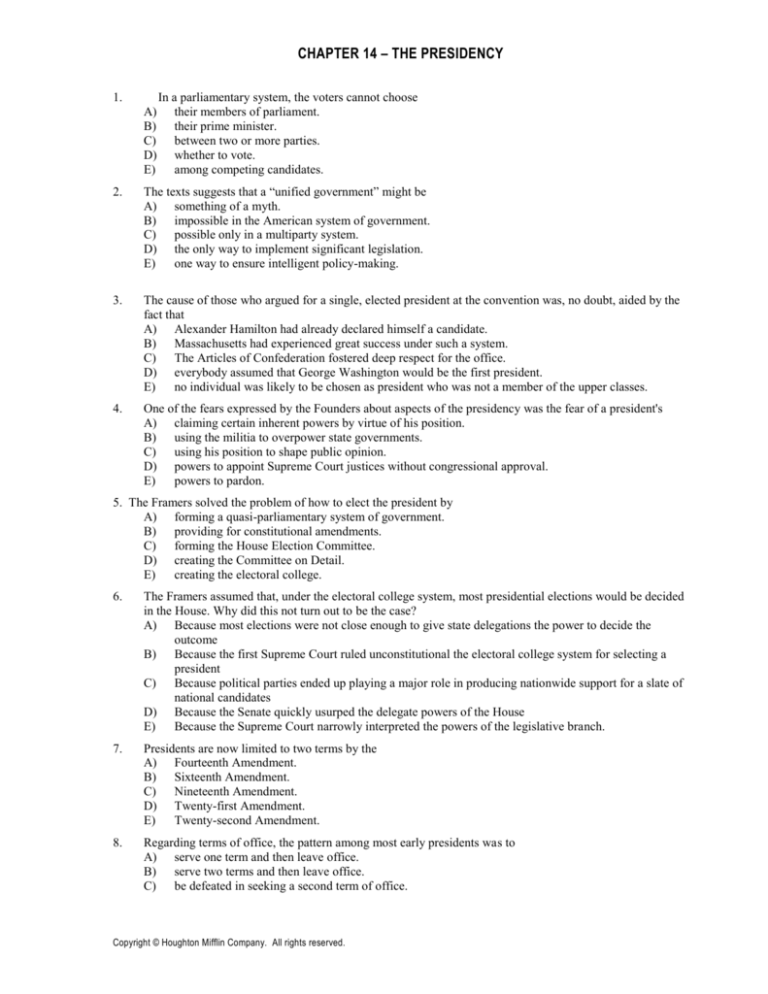
CHAPTER 14 – THE PRESIDENCY
1.
A)
B)
C)
D)
E)
In a parliamentary system, the voters cannot choose
their members of parliament.
their prime minister.
between two or more parties.
whether to vote.
among competing candidates.
2.
The texts suggests that a “unified government” might be
A) something of a myth.
B) impossible in the American system of government.
C) possible only in a multiparty system.
D) the only way to implement significant legislation.
E)
one way to ensure intelligent policy-making.
3.
The cause of those who argued for a single, elected president at the convention was, no doubt, aided by the
fact that
A) Alexander Hamilton had already declared himself a candidate.
B) Massachusetts had experienced great success under such a system.
C) The Articles of Confederation fostered deep respect for the office.
D) everybody assumed that George Washington would be the first president.
E)
no individual was likely to be chosen as president who was not a member of the upper classes.
4.
One of the fears expressed by the Founders about aspects of the presidency was the fear of a president's
A) claiming certain inherent powers by virtue of his position.
B) using the militia to overpower state governments.
C) using his position to shape public opinion.
D) powers to appoint Supreme Court justices without congressional approval.
E)
powers to pardon.
5. The Framers solved the problem of how to elect the president by
A) forming a quasi-parliamentary system of government.
B) providing for constitutional amendments.
C) forming the House Election Committee.
D) creating the Committee on Detail.
E)
creating the electoral college.
6.
The Framers assumed that, under the electoral college system, most presidential elections would be decided
in the House. Why did this not turn out to be the case?
A) Because most elections were not close enough to give state delegations the power to decide the
outcome
B) Because the first Supreme Court ruled unconstitutional the electoral college system for selecting a
president
C) Because political parties ended up playing a major role in producing nationwide support for a slate of
national candidates
D) Because the Senate quickly usurped the delegate powers of the House
E)
Because the Supreme Court narrowly interpreted the powers of the legislative branch.
7.
Presidents are now limited to two terms by the
A) Fourteenth Amendment.
B) Sixteenth Amendment.
C) Nineteenth Amendment.
D) Twenty-first Amendment.
E)
Twenty-second Amendment.
8.
Regarding terms of office, the pattern among most early presidents was to
A) serve one term and then leave office.
B) serve two terms and then leave office.
C) be defeated in seeking a second term of office.
Copyright © Houghton Mifflin Company. All rights reserved.
Chapter Error! Unknown document property name.: Error! Unknown document property name.
D)
E)
246
serve three or more terms of office.
leave office after being elected to a third term.
9.
Which of the following statements is incorrect?
A) In order to win an election, a candidate must receive at least half of the votes of the electoral college.
B) Each state receives an electoral vote for each member it has in the House and the Senate.
C) In some states, electoral votes can be split.
D) State electors assemble in Washington to cast their ballots.
E)
Electoral ballots are opened before a joint session of Congress during the first week in January.
10.
In order to win the presidency today, a candidate must win ______ electoral votes.
A) 538
B) 438
C) 370
D) 270
E)
100
11.
The last time a candidate won a majority of the electoral college without winning the popular vote was
A) 2000.
B) 1888.
C) 1876.
D) 1865.
E)
1801.
12.
Unlike this class, most Americans believe we should _______ the electoral college.
A) reform
B) amend
C) reorganize
D) abolish
E)
keep
13. The text suggests that the abolition of the electoral college might lead to
A) less partisanship.
B) an increase in PAC spending.
C) the formation of third parties.
D) a more ideological electorate.
E)
a decrease in political participation.
14.
President Lincoln justified his unprecedented use of the vague powers granted in Article II of the U.S.
Constitution by citing
A) the debates of the Framers.
B) the platform of the Republican Party.
C) the conditions created by civil war.
D) Marbury v. Madison.
E)
the Declaration of Independence.
15.
From the examples of FDR and Abraham Lincoln, one learns that emergency conditions and ________ can
offer presidents the opportunity for substantial increases in power.
A) a strong Congress
B) a popular and strong-willed personality
C) an uninterested public
D) majority support in the cabinet
E)
a compliant Supreme Court
16.
All of the following are powers that only the president is constitutionally entitled to exercise except
A) appointing ambassadors.
B) serving as military commander in chief.
C) convening Congress in special sessions.
D) receiving ambassadors.
E)
commissioning officers of the armed forces.
Copyright © Houghton Mifflin Company. All rights reserved.
Chapter Error! Unknown document property name.: Error! Unknown document property name.
17.
The powers that the president shares with the Senate include
A) receiving ambassadors.
B) making treaties.
C) granting pardons for federal offenses.
D) wielding legislative power.
E)
commissioning officers of the armed forces.
18.
According to the text, the greatest source of presidential power lies in the realm of
A) the U.S. Constitution.
B) the interpretation of laws.
C) the execution of laws.
D) foreign policy formulation.
E)
persuasion and public opinion.
19.
The rule of propinquity states that
A) power corrupts, and absolute power corrupts absolutely.
B) power tends to be shared most evenly when leadership is weakest.
C) power tends to be wielded by the people who are in the room where a decision is made.
D) power is greatest when legitimacy is strongest.
E)
power is rarely distinguishable from wealth and fame.
20.
The principal function of the White House Office is to
A) oversee the political and policy interests of the president.
B) administer federal departments as the president's representative.
C) prepare the national budget for the president.
D) supervise the national security agencies, such as the CIA and FBI.
E)
supervise military intelligence agencies.
21.
The Senate is required to confirm all of the following presidential nominations except
A) members of the White House Office.
B) the heads of Executive Office agencies.
C) the heads of cabinet departments.
D) lower federal court judges.
E)
Supreme Court justices.
22.
According to the text, the three methods by which a president can organize his or her personal staff are
A) intuitive, pyramid, and circular.
B) pyramid, circular, and ad hoc.
C) circular, ad hoc, and intuitive.
D) ad hoc, intuitive, and pyramid.
E)
circular, tubular, and linear.
23.
President Clinton's use of task forces, committees, and informal groups of friends and advisers is
characteristic of which method of staff organization?
A) Intuitive
B) Pyramid
C) Circular
D) Tubular
E)
Ad hoc
24.
When President Reagan appointed a chief of staff in 1985, he was acting according to what model of
organization?
A) Circular
B) Pyramid
C) Ad hoc
D) Intuitive
E)
Linear
Copyright © Houghton Mifflin Company. All rights reserved.
247
Chapter Error! Unknown document property name.: Error! Unknown document property name.
25.
Today, senior White House staff members are drawn from the ranks of
A) the president's campaign staff.
B) Ivy league colleges and universities.
C) the nation's top law schools.
D) Congress.
E)
the Department of Justice.
26.
The most important agency in the Executive Office of the President in terms of providing administrative
assistance is the
A) Council of Economic Advisers (CEA).
B) Office of Management and Budget (OMB).
C) Office of Technology Assessment (OTA).
D) Office of Environmental Quality (OEQ).
E)
Office of the U.S. Trade Representative (OUSTR).
27.
The prior work experience of presidential appointees to the executive branch is most likely to include
A) some federal agency.
B) private corporations.
C) foundations.
D) labor unions.
E)
judicial experience.
28.
Richard Neustadt used the label in and outers for
A) Congressmen who inconsistently supported the president.
B) members of the cabinet who resigned before the end of the term.
C) presidential staff members without experience in government.
D) persons who alternated between government and private-sector jobs.
E)
bureaucrats who changed party identification with some frequency.
Copyright © Houghton Mifflin Company. All rights reserved.
248
Chapter Error! Unknown document property name.: Error! Unknown document property name.
249
29.
Relationships between White House staff and department heads are typically characterized by
A) the revolving door.
B) teamwork.
C) mutual noninterference.
D) tension and rivalry.
E)
reciprocity.
30.
Personality plays a more important role in explaining the presidency than it does in explaining Congress
because a president is
A) more likely to rely on hands-on politics and persuasiveness to enact policy.
B) less constrained by the rules and roles that operate within government.
C) more likely to be judged by his character in addition to his accomplishments.
D) relatively immune from public opinion and polls.
E)
less constrained by the judiciary or current notions of constitutional principles.
31.
Presidents need to rely on their powers of persuasion because of their
A) limited staffs and sketchy constitutional powers.
B) opponents within the party.
C) lack of ensured legislative majorities and opponents within the party.
D) sketchy constitutional powers and lack of ensured legislative majorities.
E)
limited staffs.
32.
The presidential audiences listed by Neustadt include all of the following except
A) heads of state from around the world.
B) fellow politicians in Washington.
C) party activists and officeholders outside Washington.
D) the public.
E)
leaders in Washington.
33.
When the president uses the prestige and visibility of the office to guide or mobilize the American people,
we say that he or she is using the
A) executive prerogative.
B) inside-outside strategy.
C) regal approach.
D) grassroots podium.
E)
bully pulpit.
34.
From the time of winning office to the time of leaving it, the popularity of most recent presidents
A) decreased steadily.
B) decreased except at election time.
C) increased steadily.
D) increased except at election time.
E)
reveals no systematic trends and is impervious to elections and campaigns.
35.
Veto power and executive privilege give a president both a way of blocking action and a
A) route of appeal to the people.
B) means of affecting the party platform.
C) trump card to play with the media.
D) means of forcing Congress to bargain.
E)
means of overriding the influence of special interests.
36.
A bill is passed to the president for action while Congress is still in session. After ten days he or she has still
not approved it. What happens to the bill?
A) It is returned to Congress.
B) It is vetoed.
C) It becomes law.
D) Nothing. The president has thirty days to act on a bill.
E)
Nothing. The president has ninety days to act on a bill.
Copyright © Houghton Mifflin Company. All rights reserved.
Chapter Error! Unknown document property name.: Error! Unknown document property name.
250
37.
When President Reagan was governor of California, he could veto portions of a bill that were irrelevant to
the subject of the bill. He was exercising what is called
A) constitutional discretion.
B) a pocket veto.
C) states' rights.
D) gubernatorial averaging.
E)
a line-item veto.
38.
The presidential claims for executive privilege are based on the separation of powers and on
A) the U.S. Constitution.
B) the need for cooperation with Congress.
C) international law.
D) Marbury v. Madison.
E)
the need for candid advice from aides.
39.
United States v. Nixon held that there is
A) no executive privilege.
B) absolute presidential immunity from judicial process.
C) no unqualified presidential privilege of immunity from judicial process.
D) real but limited presidential immunity from judicial process.
E)
no presidential immunity for matters that are civil in nature.
40.
On the issue of a president's right to impound funds, the U.S. Constitution says
A) that a president must spend the money that Congress appropriates.
B) that a president does not have to spend money that Congress appropriates.
C) that a president may spend money that Congress does not appropriate.
D) that a president may spend money that Congress does not appropriate if congressional leaders support
such expenditures.
E)
nothing.
41.
The major test of presidential power with respect to impoundment of funds came in the administration of
A) Lyndon Johnson.
B) John F. Kennedy.
C) Richard Nixon.
D) Gerald Ford.
E)
Harry Truman.
42.
If a president has a particular attitude about how a piece of legislation might be implemented, he or she
might issue a
A) signing statement.
B) veto.
C) legislative veto.
D) line-item veto.
E)
amending motion.
43.
A)
B)
C)
D)
E)
44.
Which of the following statements about the legislative veto is correct?
It is an effective tool for preventing a president from reorganizing an agency or department.
It was used by Congress for the first time during the Nixon administration.
It was ruled unconstitutional by the Supreme Court in 1983.
It is sometimes used in place of a regular law to reorganize an agency or department.
It is usually employed when there is a sense that courts will review a decision.
Which of the following statements about a president's serving more than two terms is correct?
A) It has been done by only one president.
B) It is neither prohibited nor encouraged by the U.S. Constitution.
C) It is illegal under Article II of the U.S. Constitution.
D) It has never been done by a president.
E)
It has been ruled unconstitutional by the U.S. Supreme Court.
Copyright © Houghton Mifflin Company. All rights reserved.
Chapter Error! Unknown document property name.: Error! Unknown document property name.
45.
The constitutional duty of the vice president is to
A) preside over the cabinet.
B) coordinate foreign policy.
C) preside over the Senate.
D) supervise the White House staff.
E)
facilitate ratification of treaties.
46.
The purpose of creating an “acting president” in case of nuclear holocaust was created by
A) an act of Congress.
B) executive reorganization.
C) the Twenty-fifth Amendment.
D) the original U.S. Constitution.
E)
an executive order.
47.
Upon the death or incapacitation of a president and the succession of the vice president, a new vice
president is chosen by
A) the new president with congressional approval.
B) Congress.
C) popular election.
D) the Speaker of the House.
E)
the Supreme Court.
48. Who succeeds to the presidency if the president, the vice president, and the Speaker of the House die?
A) The Senate president pro tempore
B) The secretary of state
C) The most senior cabinet officer
D) The Senate majority leader
E)
The Senate minority leader
49.
________ decide(s) whether a president should be impeached.
A) The House
B) The Senate
C) Both houses of Congress
D) The Supreme Court
E)
The Senate Judicial Committee
50.
________ decide(s) whether to remove the president from office following an impeachment trial.
A) The Joint Judiciary Committee
B) The House
C) The Senate
D) The Supreme Court
E)
The Senate Judicial Committee
Copyright © Houghton Mifflin Company. All rights reserved.
251

